The Lawmatics Blog
Insights on legal marketing, automating the law practice, and legal tech in general
Law firms spend a lot of time on the same three problems: getting the right information from new leads, quickly signing prospects after they’ve been qualified, and knowing which marketing dollars are actually paying off. In this session, Product Manager Devon Butler and Account Management Lead Clare Struzzi walk through new and upcoming Lawmatics features that address each of those challenges, from QualifyAI lead evaluation to e-signature packets and upcoming Meta Ads tracking.
Time stamps of key takeaways
7:15 – Send one link for forms, signatures, and payment
16:13 – Add automation around packet completion
24:03 – Set up QualifyAI agents by practice area
31:25 – See the “why” behind each QualifyAI recommendation
45:11 – Track Meta Ads spend and leads automatically
Webinar slide deck
Law firms need a customer relationship management (legal CRM) to improve relationships with customers and drive sales growth. Businesses of all sizes are reaping the benefits of a CRM that helps them onboard new clients, build engaging relationships, and consistently deliver polished client experiences.
What is CRM?
Customer relationship management (CRM) is technology businesses use to manage their interactions with current and potential customers. Some CRMs are generic while others cater to certain business verticals or even specific sizes of businesses, such as Small Law Firm CRM (Lawmatics). The most effective CRMs include powerful tools to help companies:
- Expedite growth. Once a business begins to grow, friction may result, allowing valuable leads to fall through the cracks. But all-in-one CRM platforms enable organizations to track everything in one centralized space, so nobody drops the ball on lead follow-up.
- Keep everyone on the same page. With various natively-built tools and integrations, CRMs help businesses align their sales, marketing, and service teams to centralize daily workflows and business goals around clients.
- Share information. No matter who speaks with a potential client – sales, service, or marketing professionals – information is automatically synced and updated in the CRM system, giving a team access to accurate records that can be shared within the platform.
- Gain insight. CRM platforms do more than tell a business where a lead originated. They provide actionable insight into precisely what a potential client clicks on when they receive an email marketing message, how many times a prospect opened an email, how often a lead interacted with a sales team, and more.
- Make better decisions. The data a CRM allows businesses to effectively communicate with their current audience and reach out to those who have shown interest in the past. In doing so they seize the opportunity to provide valuable guidance during the decision-making process.
With CRM in place, marketing departments can focus on creating campaigns that resonate with an audience, sales teams can offer more in-demand products and services, and efficient companies can better serve customers.
What are the benefits of CRM?
CRM software provides numerous benefits to businesses, including law firms, that want to increase efficiency and provide stellar customer service. Five of the main benefits are custom dashboards, personalized outreach, automation potential, enhanced collaboration, and reliable data and metrics.
5 benefits of CRM for law firms:
- Custom dashboards. When a business uses a spreadsheet, data must be inputted manually, an error-prone and labor-intensive process. However, a CRM does most of the work, and customized dashboards can be set up for every user with login credentials. Intuitive dashboards allow users to see the data that is most important to their unique workflows without having to sift through data or run a report.
- Personalized client outreach. A CRM continually gathers data regarding the audience, market, and industry relevant to a particular business. As a result, users can create more relevant, personalized messaging via a drip campaign – a series of automated emails triggered by specific actions directed to a particular audience.
- Automation potential. CRM platforms offer automation, which reduces the time spent nurturing leads, prioritizes which marketing qualified leads (MQL) will most likely transition into sales qualified leads (SQL), and handles routine customer questions with chatbots or other automated messaging.
- Enhanced collaboration. A cloud-based CRM platform provides an up-to-date, shared record of all customers’ conversations, interactions, and contact information. Some systems also offer built-in collaboration tools that enable multiple users to work on one file simultaneously and follow the progress of individual matters to create a seamless workflow.
- Reliable data and metrics. Data is a valuable resource for businesses; however, it’s not usable until it is organized and converted into an actionable format. A CRM system helps companies see who interacts with the organization and through what channels. It enables the team to run reports to see where opportunities exist, how they communicate with prospective and current customers, and review sales and customer service trends.
Finding clients is challenging, and once you find them, you must establish and maintain strong relationships to keep them. CRM allows businesses such as law firms to offer high-quality, consistent, and timely customer interactions at all stages within the sales pipeline.
What is the purpose of CRM at a law firm?
Strong client relationships are at the foundation of a successful law practice. According to The Client-Centered Law Firm, to thrive in today’s competitive legal environment, law firms need to be client-centered. This means they must provide a positive client experience by building trust, forming a solid working relationship, and leaving clients willing to refer others once their matter has resolved. Legal CRM platforms help lawyers attract and retain clients, grow the firm, and support continued business expansion. Lawmatics law office CRM elevates the client experience with automated processes, customizable digital intake forms, email workflows, advanced custom fields, document request templates, e-signature capability, and more. To learn more about how the Lawmatics system will help your firm’s process run smoothly, request a demo today.
In the latest episode of Legal News Reach, Lawmatics founder and CEO Matt Spiegel joined host Crissonna Tennison to discuss what it takes to set up a law firm for success. They talked about what a growth mindset looks like at modern law firms. Here are some key takeaways:
The legal experience
Law firms don’t just provide legal services; they provide legal experiences. In addition to judging attorneys by case outcome, clients judge their attorneys by less tangible metrics:
- What was attorney-client communication like?
- Did the attorney follow-up with the client in a reasonable time?
- Was the process of making an appointment and sharing documents quick and convenient?
For modern law firms to surpass client expectations, they have to consider and design for the client experience.
Your law firm as a business
The client experience is why you need to evaluate your firm’s processes as both a lawyer and a businessperson. Along with building your firm to produce legal outcomes, you need to build it to produce business outcomes:
- How is your marketing strategy targeted?
- What’s your strategy to grow the size of your firm’s staff?
- How will you secure the reviews and referrals that are crucial to acquiring new business?
When you’re balancing your legal and business priorities, the tasks pile up and the to-do list runs longer and longer. You can only get so far with manual processes. Modern law firms are capable of a dynamism that’s only achievable with a sophisticated tech stack and an understanding of a law firm as a business.
Final thoughts
Modern businesses have entered a new era of potential because of the tools at their disposal. While CRM and marketing automation platforms have been widely adopted in other industries, only recently has the legal industry gained access to similar tools that can meet the unique needs of law firms. With legal automation software like Lawmatics, you can do more while having fewer to-dos. Freeing up valuable time from administrative work allows you to design and deliver the best possible client experience.
Podcast transcript
Crissonna Tennison
Thank you for tuning into the Legal News Reach podcast. My name is Crissonna Tennison, Web Publication Specialist for the National Law Review. In this episode, I will be speaking with Matt Spiegel, founder of Lawmatics. Matt, can you tell us a little bit about your background and what led you to start Lawmatics?
Matt Spiegel
Yeah, sure. So first of all, I'm very excited to be here, so thank you guys for having me. But yes, I’m Matt Spiegel, I am the founder and CEO of Lawmatics. I was a practicing lawyer, I don't actually practice anymore, I haven't practiced in like 11 years or so, but I still have my bar card. Long story short, I had a problem at my law firm that I wanted to solve with technology, and ended up starting a company called MyCase. So I founded MyCase, back in, like 2010. For those of you that don't know, MyCase is now one of the biggest practice management software platforms on the market. So I was the original founder of that company, I also ran the company for five years. And then I left, and after a couple years doing some things unrelated to law and legal tech, I decided to come back into the legal tech space. I'm a glutton for punishment, and Lawmatics was what I decided to build. And it was really a product of what we saw when I was at MyCase. We saw the shift in the market, we saw lawyers starting to think about their law firm like a business and not just like a law firm. And when they start to do that, then they need business tools, right? They need the same kind of tools that other companies throughout industries, different genres of companies, tools that they've had forever, right? And so there was a little kernel of this idea of lawyers shifting to this mentality, you know, back in 2014. And so fast forward to 2017, we really saw this starting to become an opportunity that we thought was going to be a big one. And so we built Lawmatics to really address the business needs of a law firm and not as much of the practice management needs, right? The practice of law, we felt like that was pretty well taken care of. Our goal was to focus on the business side of it, you know, the lead management, the marketing, the automation, that sort of thing.
Crissonna Tennison
That’s awesome, and it sounds like a major change for you. When you were first starting your switch from being a lawyer to starting MyCase, what skill sets did you have already? And what skills did you have to develop along the way?
Matt Spiegel
Yeah, so it's a good question. I mean, obviously, starting a software company is pretty different than being a lawyer. But I would say that I was probably a bad lawyer. And I just was always, I always had the skill set to be a decent entrepreneur, I guess. But I was probably just a really bad lawyer. It was very different. Well, I should strike that. Because the way I approached law--I was a criminal defense lawyer. And so I was in court all the time, I was doing a lot of trials, you know, it's a very unique practice area. But I treated my law firm like a business right from the get-go. So I worked at a big law firm for like, four years, and then I started my own practice. And when I started my own practice, I was like, “I need to treat this like a business.” And I think that was the way I thought about it, even more so than being a good lawyer. And I think that was just because I was probably very entrepreneurial, even then. And so I was thinking about my law firm as like a business that I could build, not necessarily, “I'm a lawyer, I'm going to practice law.” So I think I always had that mentality, it was just manifesting itself within the confines of the legal space with starting my law firm. But as soon as I saw this need in the market for a product, which became MyCase, I kind of ran with it. It was like, “Wow, I'm building this business, a law firm, which can be big, but it's going to have a ceiling, or I can start this, like, software company, which the ceiling is unlimited.” That just felt so much more exciting to me.
Crissonna Tennison
I do think it is very interesting that you brought up the entrepreneurial mindset, because from what I've observed there does seem to be a difference between that mindset and a lawyer mindset. It's really interesting to hear you break that down a little bit.What are some challenges that you're most proud of overcoming in starting both MyCase and Lawmatics?
Matt Spiegel
What I'm most proud of, I think, is the legal tech space is not an easy space to enter. You know, there are a lot of companies that get started and not a lot of companies make it through. The fact that I've been able to build two companies in legal tech that have both been able to support these teams--like what I'm the most proud of in MyCase and Lawmatics are the teams that we built. They're the people who made the company go and at MyCase, we just had an incredible team. It was such a great culture and at Lawmatics I think it's even better, like, you know, we've built such an incredible team with with such an incredible culture, and it's such a fun place to be and to work at. And so that's a hurdle, right? It's hard to build good cultures. You know, it's hard enough to build one company, one startup that becomes successful, let alone two in the same space, especially when the space isn't the biggest space in the world. So I think for me, you know, that hurdle of coming back into the legal tech space and trying to innovate in it, I'm think I'm most proud of that. And then the fact that we've been able to build such great teams. And that has nothing to do with the legal tech space, that's just, you know, company mindset in general, company building in general. I think if I had to say what I'm most proud of it would be the teams that we've built.
Crissonna Tennison
That makes a big difference. And I feel like the teams you're able to build and the workplace culture you're able to foster really is everything when it comes to building a company.You say that you saw some problems that you thought could be solved while you were a practicing defense attorney. So what exactly were you looking for that wasn't available?
Matt Spiegel
MyCase came as a result of client communication problems. So my first company was a result of actually a State Bar complaint that I got. When I started my first law firm, I got a State Bar complaint pretty much right away. And it had nothing to do with the way I practiced, it was nothing to do with the outcome of the case, it was simply, “Hey, you didn't call me back quick enough.” Right. And this is a tale as old as time. This is like, the most common complaint at every state bar still, even 12 years later, is attorney-client communication. And so I thought there has to be a better way to communicate than like, just calling me on the phone when I'm in court all day, every day. That cannot be the answer. And so I sought to develop a client communication portal. And that is what MyCase started as. Now it evolved into something so much more powerful and such a more robust piece of software. But the initial version, the initial idea was just simply a client communication portal. And so that's how MyCase came about. Lawmatics really came about from what I observed talking to thousands and thousands of law firms in my time in MyCase, and what we saw was this shift, this idea that lawyers were starting to think about their law firms as a business, and not just the practice of law. And when I saw that, it's like these people, if they have that mindset shift, they are going to experience some challenges with how to do that. Right? If they're going to start doing marketing, if they don't have a way to measure those marketing efforts, they're going to be met with challenges, if they don't have the ability to automate touchpoints, nurture campaigns, newsletters, like all the different things that are kind of marketing 101, if they don't have that infrastructure in place, they're going to be met with a lot of challenges. We anticipated that happening. And that's sort of the problem that we look to solve with Lawmatics. And again, we weren't reinventing the wheel. Products to solve the problems that Lawmatics solves have been around for decades, products like Salesforce, or HubSpot, they've been around for a really, really, really long time, they are not new concepts. What is new is a platform that is specifically built for law firms. And that's where lawyers are a bit unique. They do and I'm not gonna say they require, but they do significantly better and they adopt more often tools that are designed for them, because they do have some unique requirements. And so that's ultimately the problem that we look to solve with Lawmatics.
Crissonna Tennison
So as a lawyer, and as a person who's running a law firm, you want to provide a great client experience, but you actually need to find clients in the first place. So what can law firms do from a marketing and client intake perspective to help this process?
Matt Spiegel
It's about the client journey, right? A law firm needs to think about, “What is the journey that a client goes through with your law firm?” and we break that journey down into three phases.Phase one is the intake phase, which is from the moment that they reach out to your law firm, by whatever means, all the way through to the point where they sign a fee agreement, and they pay you your retainer. Then you have phase two, which is an active case, you're actually handling a case for them that has a definitive start and end time. And then phase three is after the case is over. Now, they are a former client. That is a very important part of the relationship.So what Lawmatics is designed to do is help you with everything in phase one and everything in phase three, the practice management software like MyCase, they are designed to handle everything in phase two. So that journey starts from the very moment that a client reaches out to your law firm. And you have to understand that from that very moment, you have opportunities to delight your customers, and you need to think about it in terms of customer service: what kinds of service, what level of service are you providing to your client? And this is right from the get-go. So if someone reaches out to you, and they fill out a form on your website because they're interested in talking to you, and maybe they don't hear anything from you until the next day, that's not good customer service. The first impression that they're going to get is that you don't respond to things very quickly. And so that initial moment of contact, there's an opportunity to delight your customer, right, you can immediately engage them and show them that you're on top of it. And that's not something that a lot of law firms can do without the help of technology, right? You need technology to help you with those automated touch points. And so that's just one example. But every step of the journey is an opportunity to delight your customer with customer service, not law. Forget about law. Right now we're just talking about providing good bedside manner, good customer service. I have a saying that I'd love to repeat, which is that you could be the best lawyer in the world, but if you provide bad customer service, you are going to have a failing law firm. And the vice versa is true. You could be a mediocre or even a bad lawyer, but you could provide really, really excellent customer service, and you could be wildly successful. The outcome of the legal matter is not always the most important part of that relationship.
Crissonna Tennison
That's something that I never would have thought about. But that makes sense that as a lawyer, of course, obviously, you want to win your case for your client, but you really want them to feel cared for and respected and like they can get in contact with you. And yeah, that is a lot of work to keep that going, especially because being a lawyer and running a law firm is so much work.
Matt Spiegel
Some of it is totally impossible! So here's another example, let's say after the case is over, something that would be a pretty nice thing to do would be to just send your former clients a note on their birthday every year, pretty simple. But you've got 2000 old clients, how are you going to keep track of all their birthdays and make sure you're sending an email? It would take you, it would take an army to do that. So if you have a tool that can automate that whole process, all you do is click one button when you first set up the software, and then in perpetuity, every one of your former clients is going to get an email on their birthday every single year. So there's so much that you can do that you can't do manual, you have to have technology to help you do it. I think that that's really important for law firms to understand when they're looking at, “Well, what does this mean? How do I provide good customer service? Like what role can technology play?” I think it's just really important to think about things that way.
Crissonna Tennison
The last few years have been a really chaotic time, especially for growing law firms. So what kind of feedback have you gotten from users of Lawmatics during this time?
Matt Spiegel
So the feedback that we get from our customers is pretty profound. So it's two things, it's what Lawmatics has enabled them to do. And then, you know, maybe not as sexy of a response is the amount of time that Lawmatics has saved them. So obviously, a product like Lawmatics that does so much around automation is going to save you time that really can't even be put into words, the true impact can't just be measured. And you know, some law firms are saving 20 hours a week. And that's just a crazy amount of time. And the impact that has on a firm as a whole is pretty remarkable. But it's really what Lawmatics has enabled them to do. Right? I mean, Lawmatics has really enabled growth for its customers. I think that's the way to look at it. I think law firms before you know, our customers, before they used Lawmatics, it was really difficult to facilitate big growth for them. I'm not saying that law firms couldn't grow before, that's not true. But our customers were really struggling with certain aspects of it. They were getting into marketing, they were getting into intake management and thinking about things beyond just practicing law and how to attract more leads, and how to convert more of those leads into customers. But they had no way to manage it all. Maybe some of them knew what best practices were. But they couldn't actually deploy those practices because they didn't have the ability. Lawmatics has really enabled them to do the things that they've wanted to do on the lead management, the conversion side, the generating leads, it's really pretty cool to hear the stories from these law firms that were struggling before to execute on growth plans, and now are exceeding what they thought they would be able to achieve.
Crissonna Tennison
I'm curious to hear more about why it's so essential for those people who are running growing law practices to invest in quality practice management and CRM software. At this point in the game, how much do firms risk falling behind their competitors if they don't use one?
Matt Spiegel
Personally, I feel like practice management software, right, like the MyCases, the Clios, the Practice Panthers of the world right now, I feel like that's kind of table stakes, there are definitely still a lot of law firms out there that don't use a platform like that. And for those firms, there must be some valid views. And but the vast majority of firms out there will have some sort of platform in place to help them with their time and their billing and their case management. I think that that's table stakes in the industry now for the most part. But if you don't have that, if you're like doing your billing manually, that just is a colossal waste of time. And you would be falling behind the rest of the industry significantly, just because of the time that you're wasting to input billing hours and send out invoices and things like that. But as far as CRM, this actually has the potential to make you fall behind even more. So first of all, we are at the inflection point for like CRM software and law firms. It is starting to become the focus of law firms, their understanding just how valuable it is and what they can do with it. And there's a massive shift going towards this type of thing. That's one reason why, you know, if you're not on that boat, then you just fall behind technologically, but more importantly, it's the byproduct of using a product like this. It's the shift in thinking that is happening where you're really going to fall behind because what it means is that law firms are out there thinking about marketing. They're thinking about lead generation, they're thinking about how to get more business and build their law firm. That means they're going to be going out and taking leads from you if you're not also thinking about that. So it's so much more than just a piece of software that you're talking about adopting, you're talking about adopting a strategy for your business and your growth. So if you're not on board with that, you are going to fall behind in ways that you probably haven't necessarily thought of just yet.
Crissonna Tennison
That definitely makes a lot of sense. When we look at recent years, how have expectations of legal clients evolved, kind of along the lines of what you're saying, if more and more firms are starting to really reorient their thoughts toward how they run their businesses and interact with their clients? How have their expectations evolved? And what changes have you seen in law firms and their operations since you started practicing?
Matt Spiegel
What we've really seen, I think, again, to me, it's just been the wide adoption of some type of software platform and that software platform being in the cloud. So in starting MyCase, I was one of the people who was at the forefront of this shift to cloud computing in legal. I've gotten to observe this whole thing over the last, more than a decade at this point. And it's really profound. It's really cool. Right? It's a mainstay in law firms now, cloud software. And what that's enabled, operations are just easier. And there's less operative people at a law firm, I think now, right? It's just, it requires less, because so much is in software, it's automated, it's easy to access, it's just makes things more streamlined. And so we see less of a need to have operators in a law firm and the ability for lawyers to focus more on actually handling their cases. A lot of this depends on the size firm that you are at. There's a massive segmentation inside of the law firm industry, right? Like if you have solo and small law firms, they operate very differently than midsize or large law firms.
Crissonna Tennison
That kind of goes along with things that we've heard about in the past and prior conversations about CRM systems in general. Do you think that law students will have to start having practical knowledge of CRM systems as they enter the industry?
Matt Spiegel
No. I mean, it can't hurt. But no, we saw this with practice management, too. I remember at MyCase, I would go down to the law schools, and I would help teach classes on managing a law practice and practice management software and what that meant and what it was. So the concepts we were teaching, but we weren't giving them familiarity with the actual software themselves. I don't think it's difficult to pick up, I don't think it's really that critical. What I think is important is understanding the importance of these concepts to the business. But I don't think it's critical for people coming into law firms to like, have knowledge of the systems. I mean, that would be a bonus, it would be cool. I don't think it's something that is required.
Crissonna Tennison
So along those lines, would you say there's been a change in law school education, in terms of a focus on how to run a law business? Like is that something that's showing up a little bit more in legal academia than it was in the past, or maybe when you were in law school?
Matt Spiegel
So when I was in law school, it was really not a focus. Within five or six years after I left law school, it started to become a focus again, I started getting invited into law schools that actually had practice management classes, right, like how to run a law firm. To be honest with you, in the last few years, I haven't seen it as much. So I don't know if there was a small shift towards it, like 10 years ago, and now it's shifted away from it. Maybe people thought that it wasn't a practical class. I don't really know. But I don't think that we've seen a massive shift towards it in the last five or six years. I think it's valuable to be honest with you. I think everyone always says, you go to law school, and the stuff you learn doesn't necessarily help you as a subject matter. It doesn't necessarily help you, when you get out of law school. What law school does is teach you how to think like a lawyer. Right? And that's like the old cliche, but I think it's relatively true. If law school is focused on the practicalities of running a business and running a law firm. I think that would be incredibly helpful. But unfortunately, I don't have that much influence over this.
Crissonna Tennison
For our listeners who are interested in checking out Lawmatics, can you kind of take them through the process of getting started using your platform? Where can they find you?
Matt Spiegel
Finding us is very easy, anybody can go to our website, www.lawmatics.com. And from there, what we always have people do is we have them sign up for a demo. And when I say signing up for a “demo,” I use that term a little bit loosely, because what you're really doing is you're going to be talking to one of our specialists, who's really going to spend some time learning about your law firm trying to, first of all make sure that as a law firm, you're ready for a tool like Lawmatics, like Lawmatics is going to make sense for you as a law firm, and then starting to understand “What do you do currently? What are your processes like?” and then starting to show you how Lawmatics might be able to help. So when we get on this demo, it's almost like a consultation. We have a lot of best practices that we share with people during this consultation, this demo, to hopefully get these law firms thinking about things a little differently. We really like this process. And that's the most important thing for people to do is to just come to our website, sign up for that demo, you're going to learn a little bit about Lawmatics, you might learn a little bit more about your law firm and certain steps you might need to take in order to execute on some of the initiatives that you're looking to execute on at your law firm. And then we will show you how Lawmatics hopefully can help you do that.
Crissonna Tennison
That's awesome. It sounds like the Lawmatics experience can be tailored to a variety of different law firm types.
Matt Spiegel
Lawmatics is really for everyone and anyone. We see it all across the spectrum. Sometimes brand new firms that are just trying to set up their tech stack and Lawmatics is the foundation of it or law firms with several hundred lawyers who have been around for a long time, but they need to update their tech stack and they see a lot of value in it.
Crissonna Tennison
Our time is coming to a close, so are there some points you would like to showcase that align with your organization's experience?
Matt Spiegel
Lawmatics is Lawmatics, it's great if people want to check it out, I encourage them to do that. But what I encourage all lawyers to do, regardless of the software platform, is to just start thinking about your law firm a bit differently and start thinking about your law firm as, you’ve got to be good at customer service. You have to think about satisfying your customers outside of their case, you cannot think, “if I get them a great outcome, if I'm a criminal defense lawyer, and I just defended my client out of prison,” you can't just assume that that's going to be enough, that that's going to make them really happy. What you need to do--and this is a point that I was thinking about earlier that I want to bring up now--is this is what you need to remember. And if you remember this, I think it gives you a different lens to look through almost all practice areas, right? Almost all of them fit into this mold, where it is the most important thing happening in their life. If it's a criminal offense case, if it's a personal injury case, if it's a bankruptcy case, if it's a family law case, immigration, all these practice areas, like the vast majority of practice areas out there, the case that you are handling for your client, it is the most important thing that they have going on in their life. For you it's just another client, right? And so sometimes it's hard to have that perspective. But if you think about it like that, if you think “Hey, wait a second, this is the most important thing happening in their life. If I had the most important thing happening in my life right now, how would I want to be treated?” If you shift to that line of thinking I guarantee you will provide incredible customer service, and that's going to benefit your firm.
Crissonna Tennison
Yeah, that makes a lot of sense, especially because if they're dealing with something that is the most important thing in their life, and you're the person guiding them through that, then that relationship is pretty important. So thank you for kind of expanding on that a little bit more.Thank you to Matt Spiegel for taking the time to join us on the podcast to talk about Lawmatics and the different mindsets that can help a law firm be more successful. We really appreciate you joining us today.
Matt Spiegel
Yeah, thank you guys so much for having me. I really appreciate it.
Conclusion
Thank you for listening to the National Law Review’s Legal News Reach podcast. Be sure to follow us on Apple Podcasts, Spotify, or wherever you get your podcasts for more episodes. For the latest legal news, or if you're interested in publishing and advertising with us, visit www.natlawreview.com. We'll be back soon with our next episode.
‘Tis the season for holiday sweaters and eggnog, as well as a new batch of features from the Lawmaticians! Cozy up by the fire and unwrap these exciting new additions to Lawmatics.
Quickbooks Integration
We are thrilled to share the release of our latest integration, Quickbooks! Automatically create a customer and invoice in Quickbooks when an invoice is sent to a matter via Lawmatics. Map your accounts, field types, time entries, and expenses to ensure that pertinent matter data syncs from Lawmatics to Quickbooks. Whether you or a fellow staff member manage your firm’s books, this integration is sure to make invoice generation a breeze.
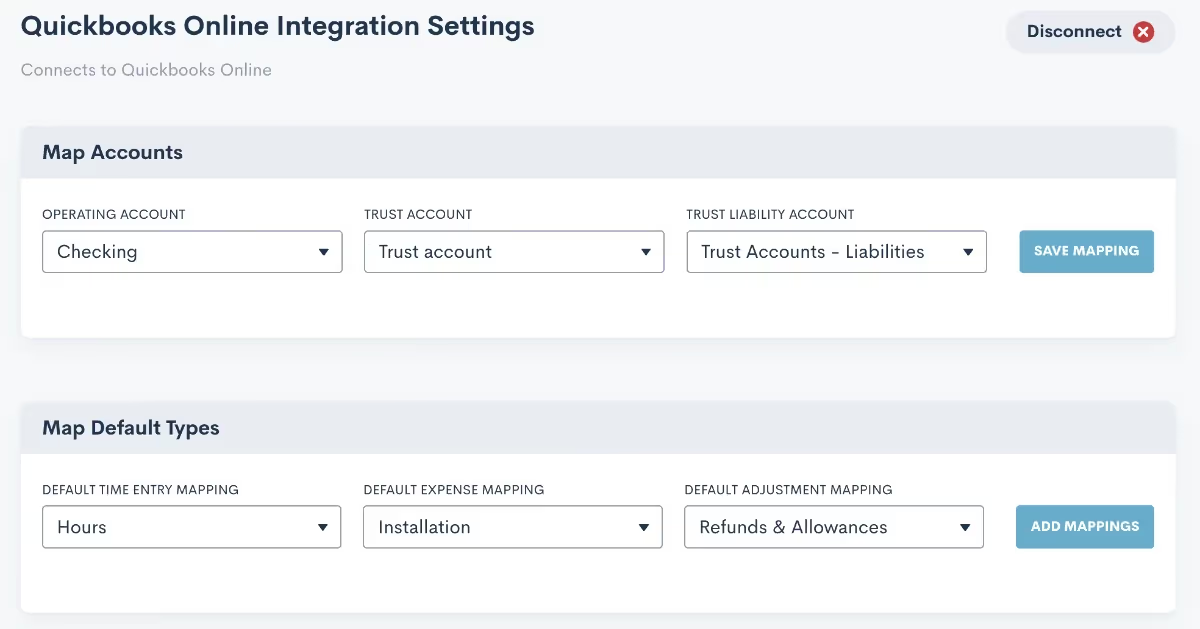
Learn more about this integration here. Not yet using LMPay? Click here to get started!
Send from Outbox
A highly anticipated feature among Lawmatics users, any emails sent via Lawmatics can now be set to appear in the outbox of your preferred email client. This update will help improve your firm’s email organization by storing all email correspondences in one central place — alongside your other communications. Once activated, any email sent to or received from an email address that is tied to a matter in Lawmatics is automatically logged in the timeline for that matter. And for quick reference, you can easily go to your outbox to see all emails sent from your address, including those sent via Lawmatics.
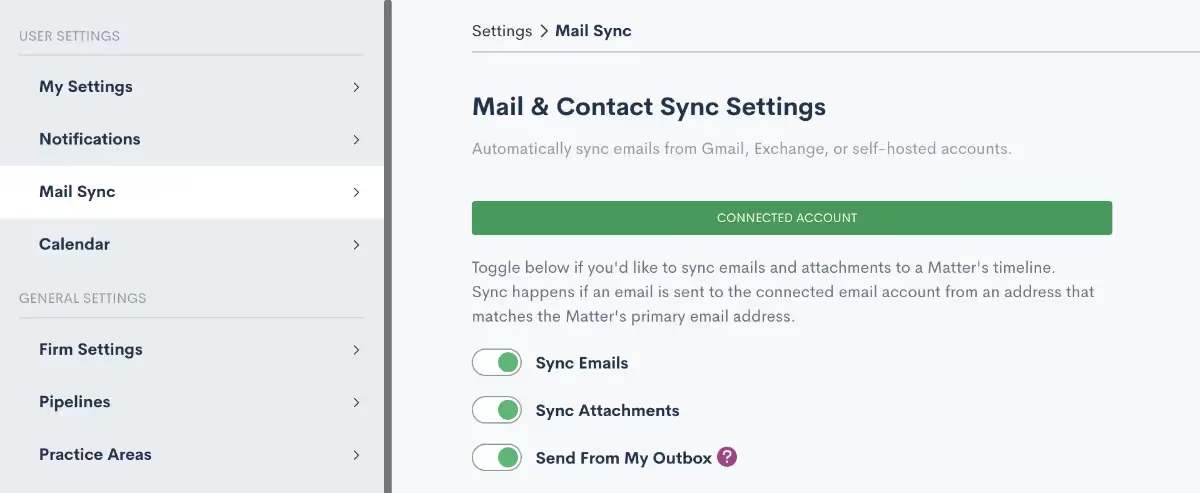
To learn more about Send From Outbox, click here.
Matter Numbering
To easily track down and reference cases in your docket, you can now auto-generate a case number and custom title into a matter’s title field as unique identifiers. Further refine your case numbering sequence by adding custom text or database fields such as practice area, lead attorney, client’s last name, etc. Once saved, the resulting case title format will automatically be applied to each of your matters moving forward. Begin auto-numbering your cases by navigating to the Matters page within settings, scrolling down on the page and toggling on “Enable Auto Numbering”.

Read more about auto numbering here.
Booking Form Updates
Automatic scheduling is a favorite feature of many Lawmatics users, and it just got even better. To accommodate virtual meetings in addition to face-to-face meetings, you can now select Zoom as a meeting location option, along with any of your physical office locations on your Booking Forms. Furthermore, we have added the ability to allow multiple attendees in one event. If any of your matters involve the representation of multiple clients, easily add them both to the meeting invite. With the growing popularity of virtual meetings, these upgrades grant your clients the flexibility to choose which option works for them, and have the zoom link added in automatically when needed.
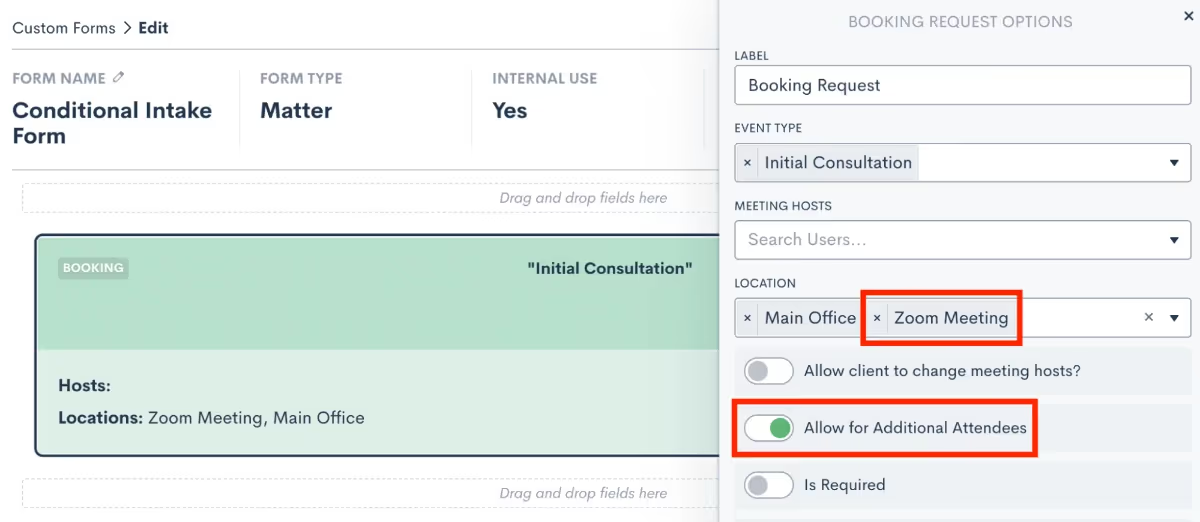
Click here to learn how to use booking forms.
Time & Billing Additions
Request Funds for Trust Account
The latest addition to our Time & Billing system allows you to request funds from a matter for their trust account with the option to let them pay via credit card. Paired with your minimum balance alerts, this will help ensure that a client’s trust balance stays above your designated minimum amount.
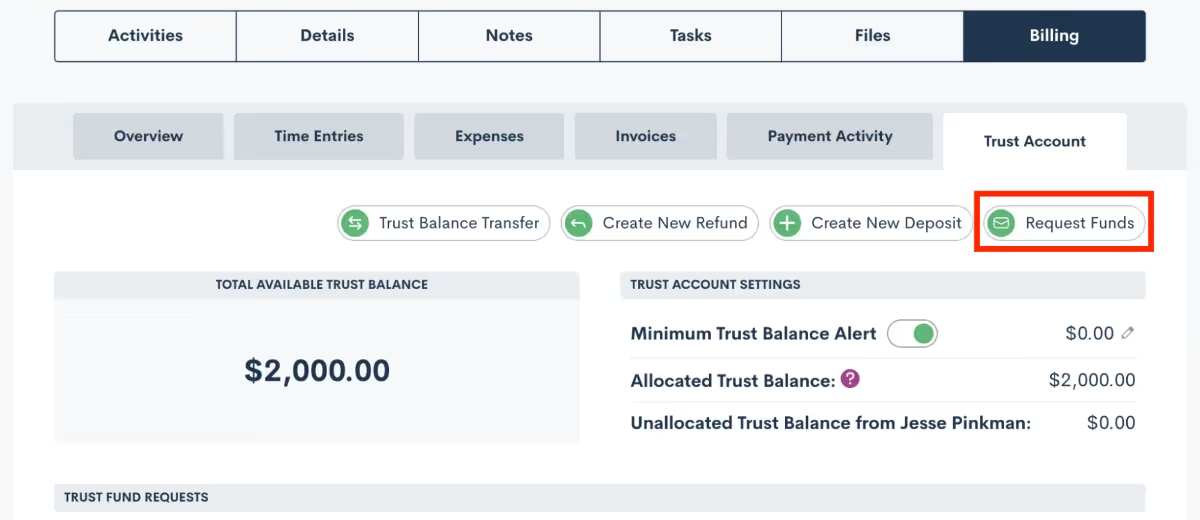
Learn more about Trust Accounting here.
Payment Activity Report
Lawmatics Reporting, a core function of our platform, now features a new report for tracking incoming client payments. With the Payment Activity report you are able to set custom filters for the date, payment method, and/or contact. Run the report to see a snapshot view of the payments that meet your criteria, making it even easier to keep an eye on your firm’s incoming cash flows.
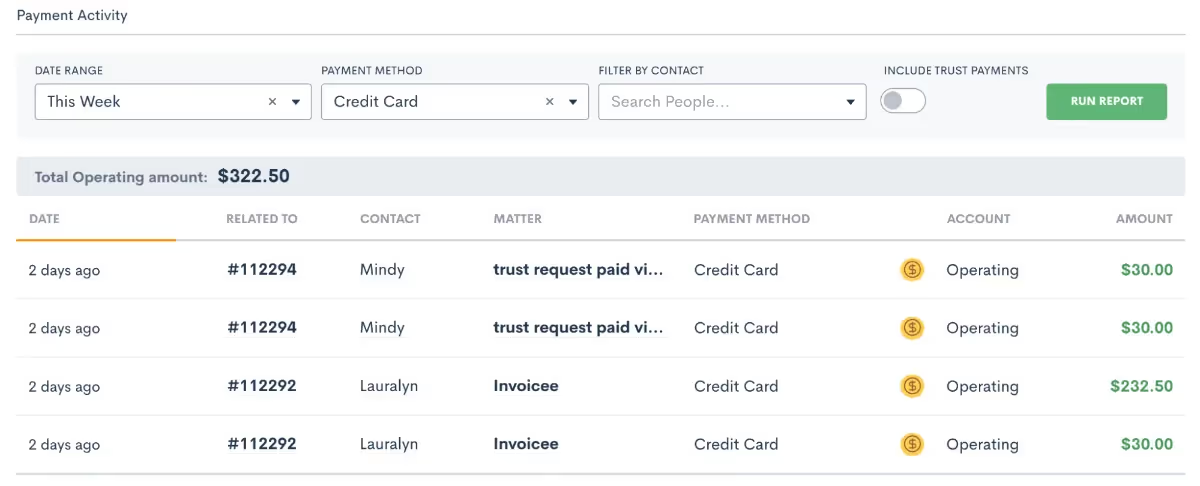
Click here to read about the different reporting options for Lawmatics time & billing.
MyCase Integration - Relationship Sync Added
In case you missed our recent announcement, Lawmatics now integrates with MyCase! This integration has only been available for a month and we’ve already released an update: Relationship Sync. When syncing a main matter contact from Lawmatics into MyCase, you can now sync related contacts with a simple toggle (pictured below). This is yet another way Lawmatics removes tedious data entry from your process, and replaces it with automation.

Read up on the MyCase <> Lawmatics Integration here.
New Task Statuses
Get more tasks accomplished, and keep your to-do list tidy with a new and improved list of task statuses. Whereas previously Lawmatics tasks could only be designated as complete or incomplete, we’ve introduced new statuses that account for dependencies or stasis in your processes. In addition, the Tasks dashboard can now be sorted by these statuses for quick reference. Stay tuned for more updates to come regarding Lawmatics tasks.
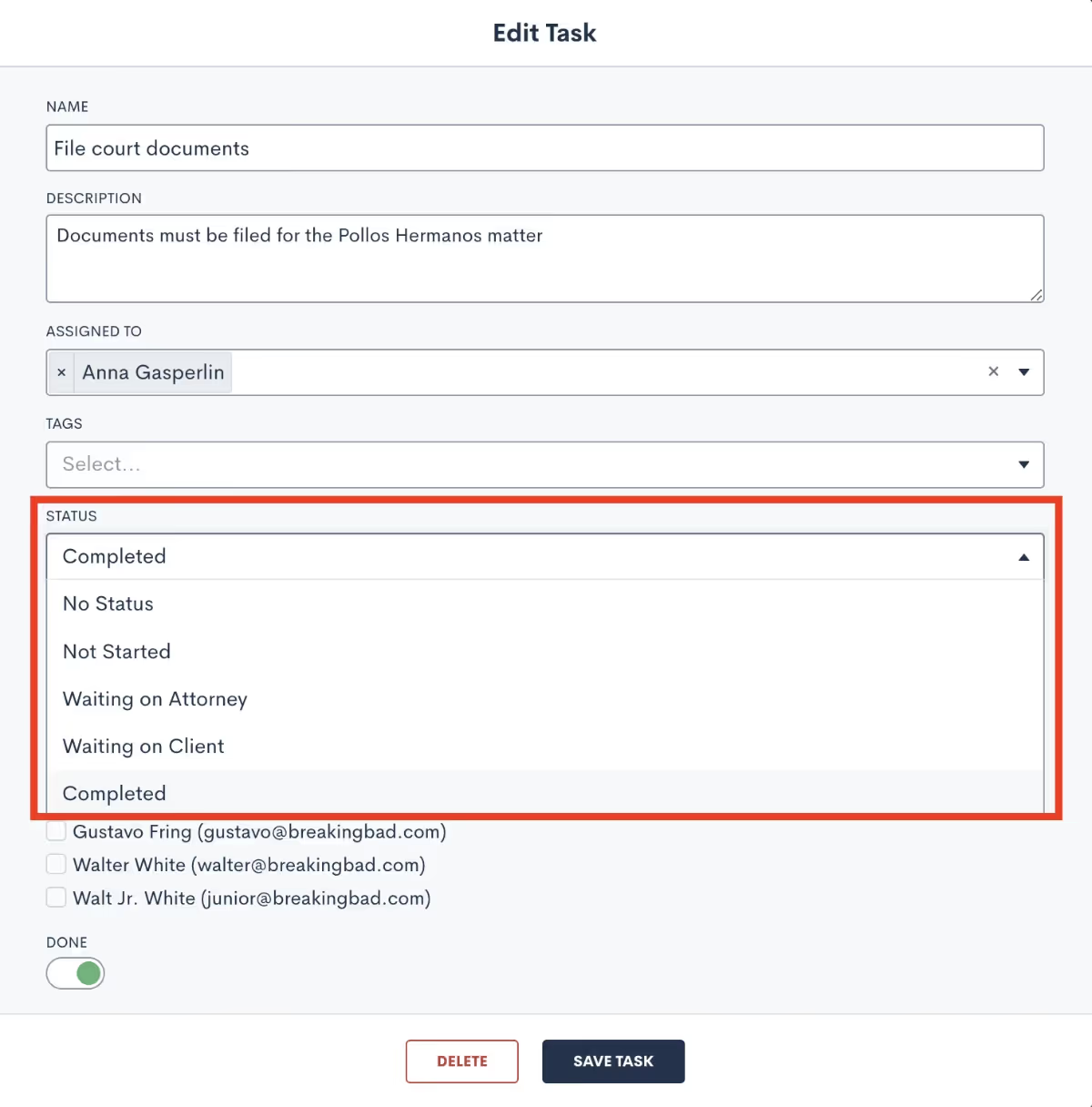
Click here to learn all about tasks.—We hope this batch of additions to Lawmatics keeps you warm during the holiday season. Until then, we’ll be cooking up a hearty helping of new features to release over the coming months As always, reach out to us at support@lawmatics.com with any questions. See you in the new year!
Technology can set a law firm up for success or bog down its processes and adversely affect its bottom line. Since the COVID-19 pandemic sparked change and challenges in the legal industry, lawyers are rapidly adopting more technology, such as attorney CRM software, than ever before.Although some thought the shift to remote work would disappear after the pandemic, this has not been the case. According to a new report from the American Bar Association (ABA):
- Approximately 87% of the lawyers who responded said their workplaces allow them to work remotely.
- 44% of the young lawyers surveyed would leave their current positions for a greater opportunity to work remotely elsewhere.
- Almost 2/3 of the private practice attorneys surveyed have the flexibility to choose their own schedule and can work remotely 100% of the time if they want.
- Among women lawyers, 56% reported that remote work increased their ability to balance work and family obligations.
As a result, it’s become more important than ever for law firms to know and provide the things lawyers need—such as legal CRM software. This allows each lawyer to provide legal services the way they choose – remotely, from the office, or a combination of the two. And staying current is one of the good things lawyers do.
What to Consider When Choosing a Software?
Selecting the right legal software is a critical decision for any law firm, impacting efficiency, productivity, and client satisfaction. When evaluating options, consider the following key factors to ensure the software aligns seamlessly with your firm's needs:
- Features. Evaluate the range of tools in a given software that address your firm’s specific needs, such as case management, document automation, time tracking, and billing.
- User experience. An intuitive interface requires minimal training and promotes adoption throughout the firm. Check if the vendor provides training materials, including onboarding, webinars, and ongoing support.
- Scale. Choose a software that can grow with your firm. If you’re just starting your own solo practice, consider software options with a less ambitious scale than enterprise business software.
- Customization. Modern legal software should be flexible enough to cater to your firm's unique workflows and preferences, from customizable fields to adjustable templates.
- Integration. Ensure the software can seamlessly integrate with other tools your firm uses, such as email platforms, accounting systems, and practice management software.
- Security and compliance. Given the sensitivity of legal data, robust security features like encryption, multi-factor authentication, and regular backups are non-negotiable.
- Cost and value. Weigh the cost of a software — including subscription fees, set up charges, and add-ons — against the return on investment of faster processes, better organization, increased bandwidth, and more responsive client service.
- Reviews and ratings. Seek out reviews and ratings from other legal professionals, and consider the most common strengths and weaknesses they identify in the software they use.
By keeping these considerations in mind, law firms can make an informed decision to adopt software that enhances their operations, improves client service, and positions them for future growth.
What tools and technology do lawyers use?
The most successful lawyers and law firms use technology to work more efficiently and securely in an increasingly remote workplace. Here are some of the most common computer software platforms used by today’s lawyers:
- Lawmatics. Law firm CRM software elevates the client experience and eliminates manual tasks with intake automation, digital intake forms, SMS & email campaigns, marketing performance analytics, document request templates, e-signature, and more. Read Lawmatics reviews here.
- Microsoft 365. Software as a service program Microsoft 365 includes essential business tools like Word, Excel, OneNote, Outlook, PowerPoint, SharePoint, Teams, and more.
- Google Workspace. Formerly known as G Suite, Google Workspace provides an array of features, including Google Docs, a word processor similar to Microsoft Word, that is a good option for attorneys whose work requires collaboration.
- Kenect. If text messaging clients directly is essential to the lawyers at your firm, platforms like Kenect will allow you to sync your contacts directly into the system, view a log of text conversations in real-time, and trigger messages based on case status.
- LawPay. Lawyers utilize software solutions like LawPay to send out invoices and facilitate credit card and other online payments.
- RingCentral. All-in-one platforms for voice, video meetings, team messaging, and collaboration like RingCentral are popular with attorneys who favor click-to-dial functionality and one-click video conferencing capabilities.
- DocuSign. In 2000, the U.S. passed the Electronic Signatures in Global and National Commerce Act (ESIGN), making electronic signatures legal in every state and territory where federal law applies. Electronic signature platforms like DocuSign makes document signing faster, easier, and more secure for lawyers and clients.
- Corvum. Voice over Internet Protocol (VoIP) technology offers texting and calling for attorneys in various practice areas, including criminal defense. Corvum uses an internet connection, integrates with Clio practice management software, and is a top choice for attorneys who frequently travel for research or cases.
Lawyers frequently become more efficient, profitable, and client-centered when they use the proper technology.
What research tools do lawyers use?
According to the ABA’s 2021 Legal Technology Survey Report, the typical lawyer spends an average of 21 percent of their time conducting legal research, up slightly from 18 percent in 2020. Here are some of the platforms they commonly use:
- Westlaw. An online legal research service and proprietary database for attorneys and legal professionals, Westlaw is available in more than 60 countries and provides access to case law, articles, publications, court documents, and legal news.
- Lexis Nexis. According to the ABA’s 2021 Legal Technology Survey Report, practicing attorneys in small firms chose Lexis Nexis as the top legal research vendor.
- Fastcase. One of the largest online libraries in the world, Fastcase integrates with Clio to give attorneys remote access to case law, regulations, statutes, constitutional law, and more.
The survey found that 60 percent of the attorneys surveyed regularly use paid online resources for research, and nearly as many (59%) use free online sources.
What does law practice management software do?
Law practice management software is an all-in-one system that helps firms manage day-to-day workflows like calendaring, case management, tasks, time tracking, billing, and accounting within the practice. Cloud-based practice management, such as Lawmatics software, features robust tools to help law firms manage cases, increase revenue, and offer a better client experience.
Benefits of Using Lawmatics Legal Software
In an era where efficiency and client satisfaction are paramount, Lawmatics helps law firms thrive. By leveraging advanced features and automation, Lawmatics equips legal practices to manage daily operations more effectively while positioning them for long-term growth. Here’s how:
- Automated workflows. Lawmatics automates routine tasks, such as client intake and document generation, freeing attorneys to concentrate on complex legal work that demands their expertise. This streamlined approach not only reduces the administrative burden but also speeds up case management. In fact, 91% of law firms surveyed reported increased efficiency after adopting Lawmatics.
- Data-informed decisions. Real-time analytics and comprehensive reporting empower law firms to identify profitable practice areas and target inefficiencies. By understanding these key metrics, firms can make informed decisions that drive profitability and optimize resource allocation.
- Enhanced communication. Automated follow-ups, personalized messages, and client portals keep clients updated and engaged throughout their case. This level of communication fosters trust and satisfaction, leading 80% of Lawmatics users to report having happier clients with Lawmatics.
- Lead management. Lawmatics leads through automated marketing campaigns and client touchpoints, optimizing the client acquisition process. This functionality not only increases the client base but also ensures steady business growth.
By integrating Lawmatics into their practice, law firms can enhance day-to-day operations while building a robust foundation for future growth. From automating mundane tasks to improving client interactions, Lawmatics empowers legal practices to stay competitive, effective, and ready to meet the challenges of an ever-evolving legal landscape.
Lawmatics integrations
Lawmatics law office software seamlessly integrates with some of the most popular software applications that also help lawyers do more of the good things lawyers do (below).
Adopting the Right Software for Your Law Firm
In today's fast-paced legal environment, adopting the right software is crucial for law firms looking to enhance their practice and client relationships. From legal CRM platforms and practice management software to comprehensive research databases, attorneys have a variety of tools at their disposal. These technologies enable lawyers to handle tasks ranging from case management and document automation to time tracking and billing, all while ensuring secure and compliant operations. Additionally, popular communication and collaboration tools–like Microsoft 365 and Google Workspace–facilitate seamless remote work, empowering lawyers to stay connected and productive from anywhere.Investing in the appropriate software not only streamlines routine administrative tasks but also opens doors to more data-informed decision-making and improved client relations. By embracing these technologies, law firms can enhance their operational efficiency, boost profitability, and deliver superior service to their clients. Find out more about how Lawmatics can streamline legal client intake, marketing, billing, and other processes with automation.
FAQs
Q: What software do law firms use?A: Law firms typically use practice management software, billing software, and document management systems to handle their operations efficiently.Q: What is CRM software for lawyers?A: CRM (Customer Relationship Management) software for lawyers helps manage and track client interactions, schedules, and follow-ups to improve client relationships and firm efficiency.Q: Do law firms need a CRM?A: Yes, law firms benefit from CRM systems as they streamline client communications, enhance client satisfaction, and improve overall efficiency.

While Lawmatics has all the tools you need for collecting and inputting data, what good is all that data if you aren’t using it to gain insights on the performance of your firm? With the power of Lawmatics Custom Reporting and the Analytics Dashboard, you are able to make decisions from a business standpoint to grow and improve your firm.In addition to the KPIs you should be monitoring, Lawmatics gives you the ability to customize and export any of your reports. Meanwhile, the analytics dashboard grants you easy access to metrics like conversion rate, cost per lead, and custom growth goal settings.With all of these features at your fingertips, you’ll be able to grow your business without any guesswork or lack of insights into the trajectory of your business.
Custom Reporting
With custom reporting the possibilities are truly endless in Lawmatics. Slice and dice your data any way you want by essentially creating a table with any fields, filters, grouping, and date range. Furthermore, your reports automatically refresh in real time, meaning that each time you view one, you are seeing the most up-to-date information.
Columns
The first step in creating your custom report is to add fields to be used for your columns. Select from any of the built-in system fields, or any of your custom fields. Simply scroll though the complete list of fields, as shown below, or start typing the name of a field to easily access it.
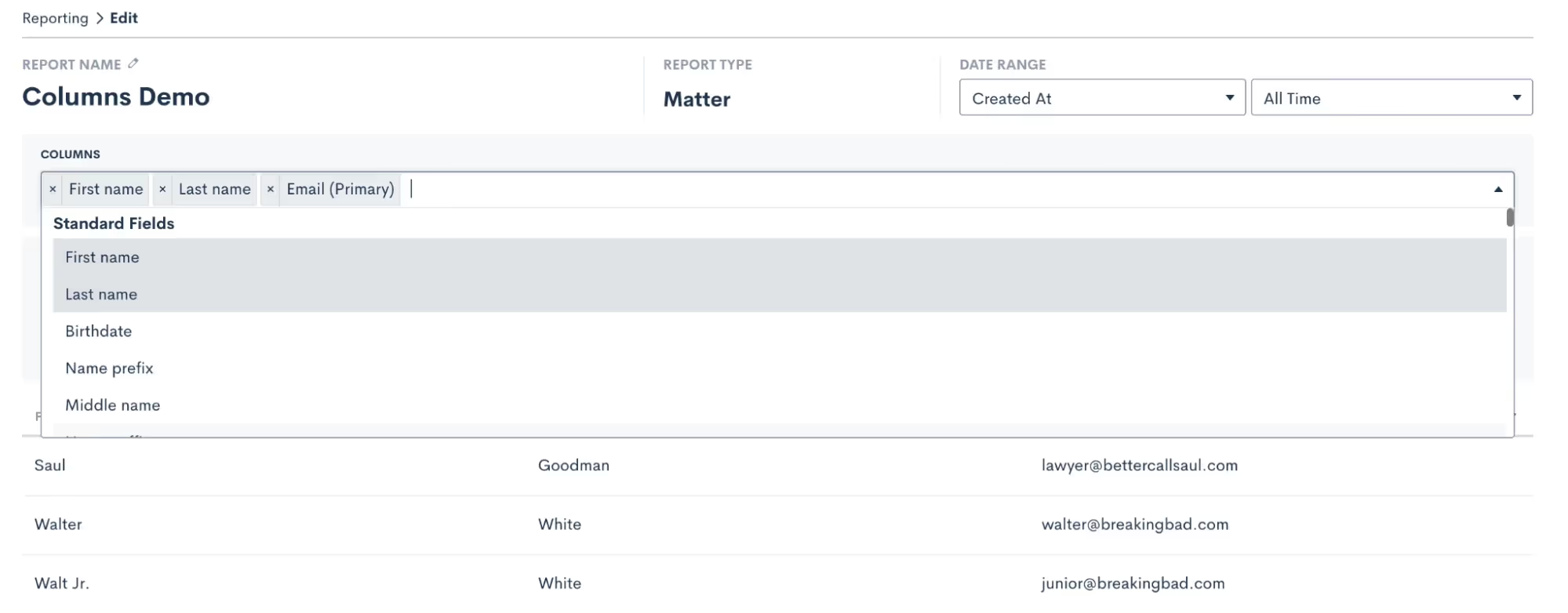
Any fields that you select will be added as a column into your report.
Filters
Depending on the goal of your particular report, filters can be your best friend. These let you keep the report relevant to the specific KPI, field, etc that you wish to report on. For example, you may create a custom report to only show hired clients. This can be useful if you are looking to narrow in on a data point relevant only to current or past clients, as opposed to leads or lost leads. To do this, simply add a filter. In the example below, we have filtered the report using the Source field, and have selected to only show the Hired matters.
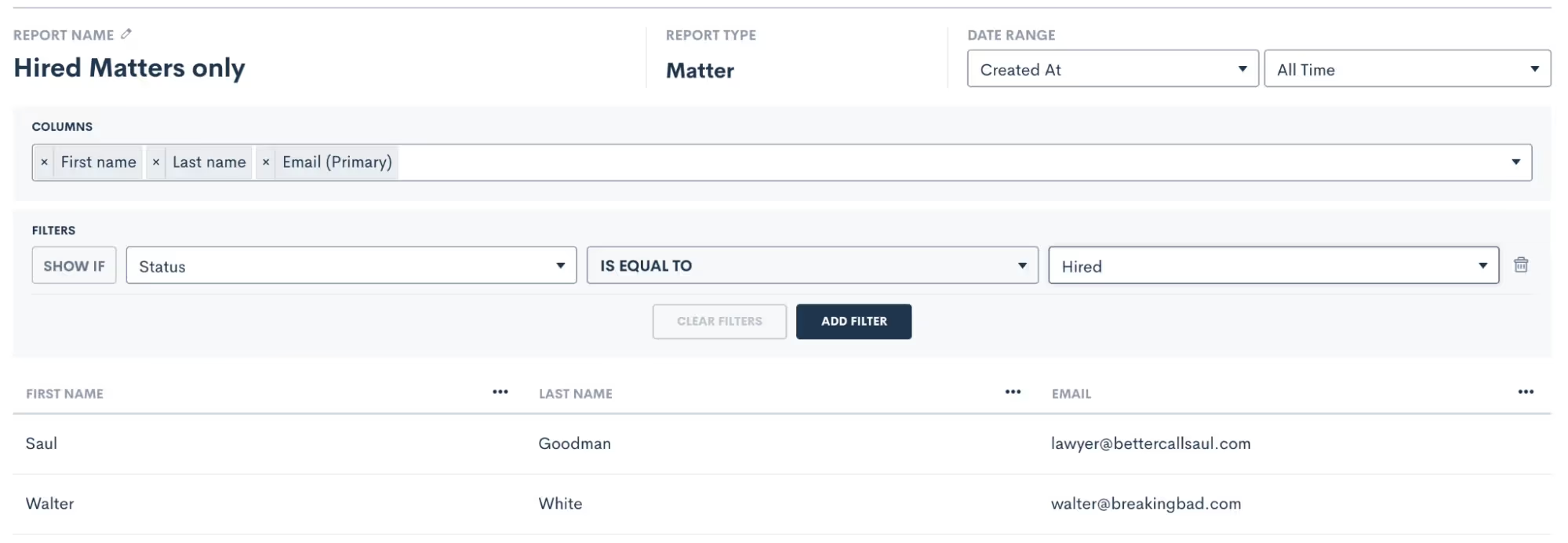
Once you make this selection, the report preview will update to show only results specified by your filters.
Date Range
Similar to adding field filters, you may also filter your report by date. Create a report that shows only the current week or month at a glance, and each time you view it it will be up-to-date for the current date match. Use the drop down in the top left to first select which date field you want to filter on. For instance, the date the matter was created, converted, or any other custom date field.

Then select the date range, using one of the preset options, or create a static custom range for this report.

Grouping
You may have plenty of reports where simply adding columns and filters gets you the data you need. Grouping is a power feature that can add even more insights to your report. When you group by a particular column you will be able to easily see the total number of results in each group, which can help determine performance.For example, you may wish to see how many leads came in for each of your practice areas in a particular month. Grouping would be very useful in this situation. Click the column header, and then select Group by this column.

The report will then look as follows:

We can easily see that Criminal Defense was the most used practice area in the graph above. Also notice how you have the option to subgroup, as shown in the top right corner in the image above. This will add a second grouping by that field within each main group.
Sample Reports
Let’s walk through a few sample reports that may be useful for your firm. Keep in mind that the sky’s the limit when it comes to custom reporting, so these are merely suggestions to get you started.First, you may find it useful to create a report showing the marketing source of each matter in your CRM. When you select your columns for this report, make sure to include both the “source” and “campaign” fields, in addition to whatever fields you may wish to see like practice area, converted date, phone number, etc.You will find grouping on the “source” field helpful for this report, so that you can easily see how many matters came from each source. Then, we suggest adding a sub group by “campaign”, so you can also see insights on each campaign within your sources. Your report will end up looking something like this:
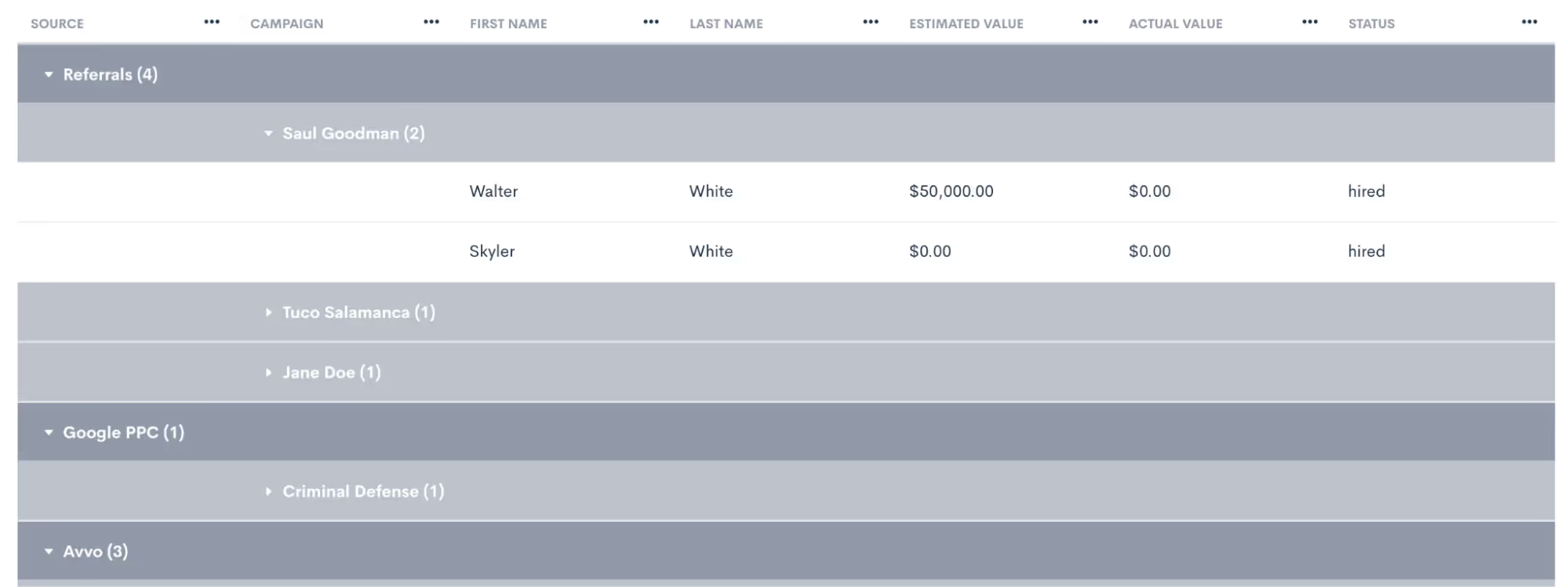
Example KPIs pictured above:
- Matters per marketing source
- Campaign breakdown within each source
Another way you can use a custom report is to track the estimated and actual values of your cases. When you add either, or both, of these fields to your report you will have the option to sum or average each of these columns. Of course with this report it is important to make sure that you are populating these values on each of your matters accurately and timely in order to get best results.When you use any currency or number type field on a report you will have the option to add a sum or average calculation, as shown below.

In this example, we have opted to sum the estimated value, but average the actual value.

Example KPIs pictured above:
- Matters per practice area
- Total value in pipeline per practice area and per source
- Average revenue per practice area and per source
Remember that any of these custom reports can also be exported to excel, where you can apply more advanced calculations and formulas as needed.
Analytics Page
In addition to building your own custom reports, Lawmatics also provides you with a built-in analytics dashboard for basic firm KPIs and other statistics. You’ll find this page by hovering your mouse on the Insights tab, and then select Analytics.
Dashboard
When you first arrive on the Analytics page you will first see the Leads at a Glance section of the dashboard. Before diving into these stats, first note that you can adjust the date range of this page as a whole. You’ll find this in the top right corner, it defaults to All Time, but you can make a custom date selection accordingly.

Once you have selected your desired date range, all data on the page will update automatically. First, in the Leads at a Glance section you’ll see a quick breakdown of some key statistics for lead intake and conversion.As you scroll down the Analytics page, you will see a number of different graphs and charts for nearly every aspect of your firm. We’ll walk through a few of them here.First, set customized growth goals for new leads and converted clients by clicking the icon highlighted below.

While you can also use custom reporting for reporting on things like leads per practice area or source, the Analytics page gives you a visual breakdown of the same information. This can be great for getting a snapshot view.

Additionally, you’ll find a built-in graph for tracking your appointment show rate by event type. This may provide great insights on performance of different types of meetings you hold with leads and/or clients that you would have never thought to look into before.

Some firms have designated sales people as opposed to (or in addition to) intake staff and paralegals. As with any sales team, it is crucial to be able to track each individual’s conversion rate in order to compensate and incentivize the team. Use the Sales Stats graph to do just that, by viewing a breakdown of conversion stats by sales person.

Stats By Source
Lastly, on the Analytics page you will find the Stats by Source section. This gives you a comprehensive breakdown of key KPI calculations for each of your marketing sources.

In this section you will be able to clearly see an apples to apples comparison of each source, taking into account how much you spent on that source, how many leads came in, the conversion rate, and a breakdown of cost per lead and client.Example KPIs pictured above:
- Total new leads and converted clients by source
- Total revenue and total spend on each source
- Breakdown of cost per lead and cost per client
ROI Tracker
When used in conjunction with the Stats by Source analytics, the ROI Tracker helps complete the full picture of the marketing performance for each of your sources. The tracker takes into account the number of new leads, the conversion rate, and the revenue and spend from each source to give you an ROI calculation.
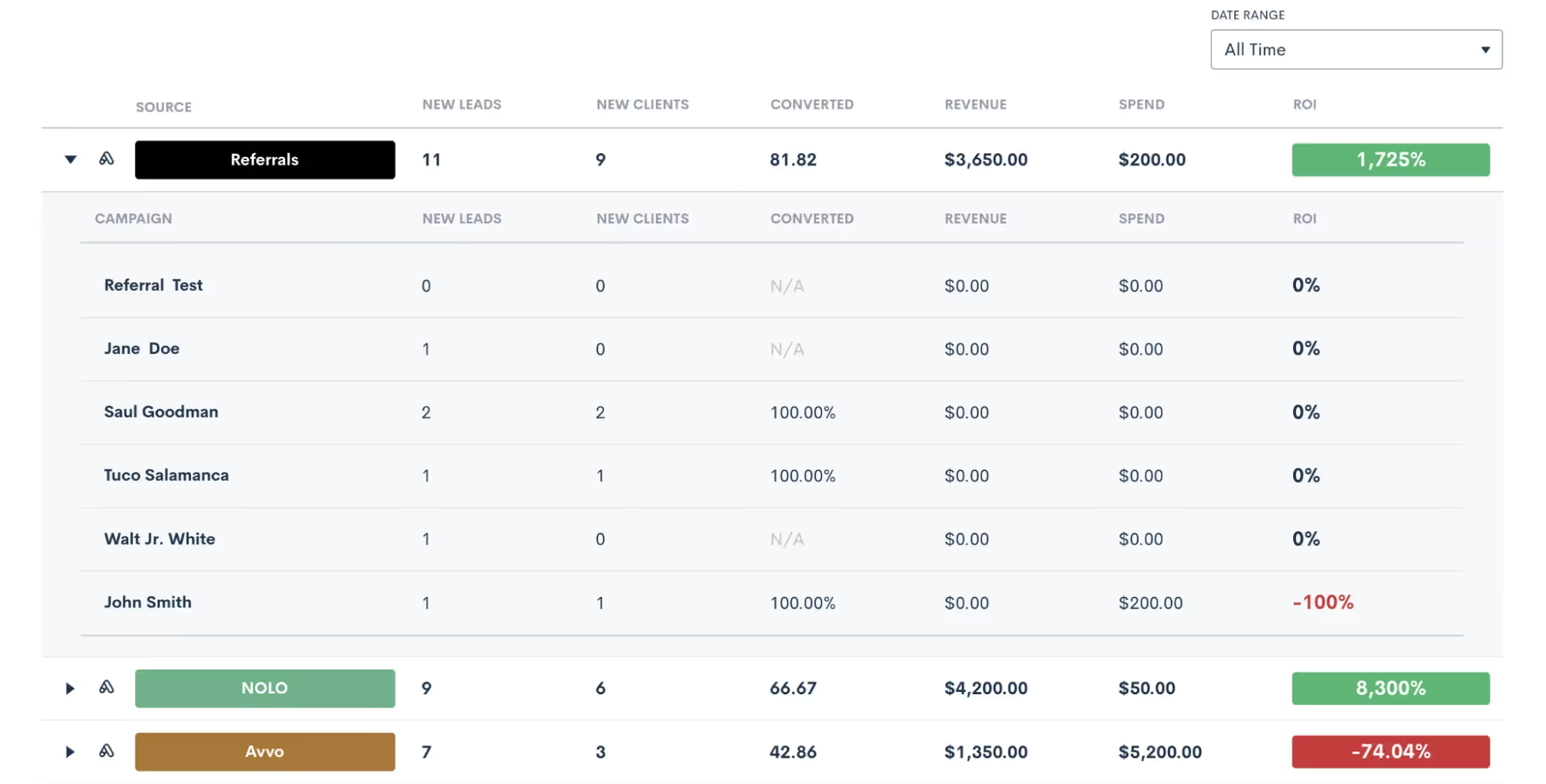
Marketing Source Spend
Before using the tracker, it is crucial to make sure that you are entering your marketing spend accurately on the marketing settings page. Once you navigate to that page in settings, you can make sure that you have all of your sources entered, along with any relevant campaigns under each source.The marketing spend is logged at a campaign level. Once you have added your campaigns, click the dollar sign icon for each one to enter the spend for that particular campaign.
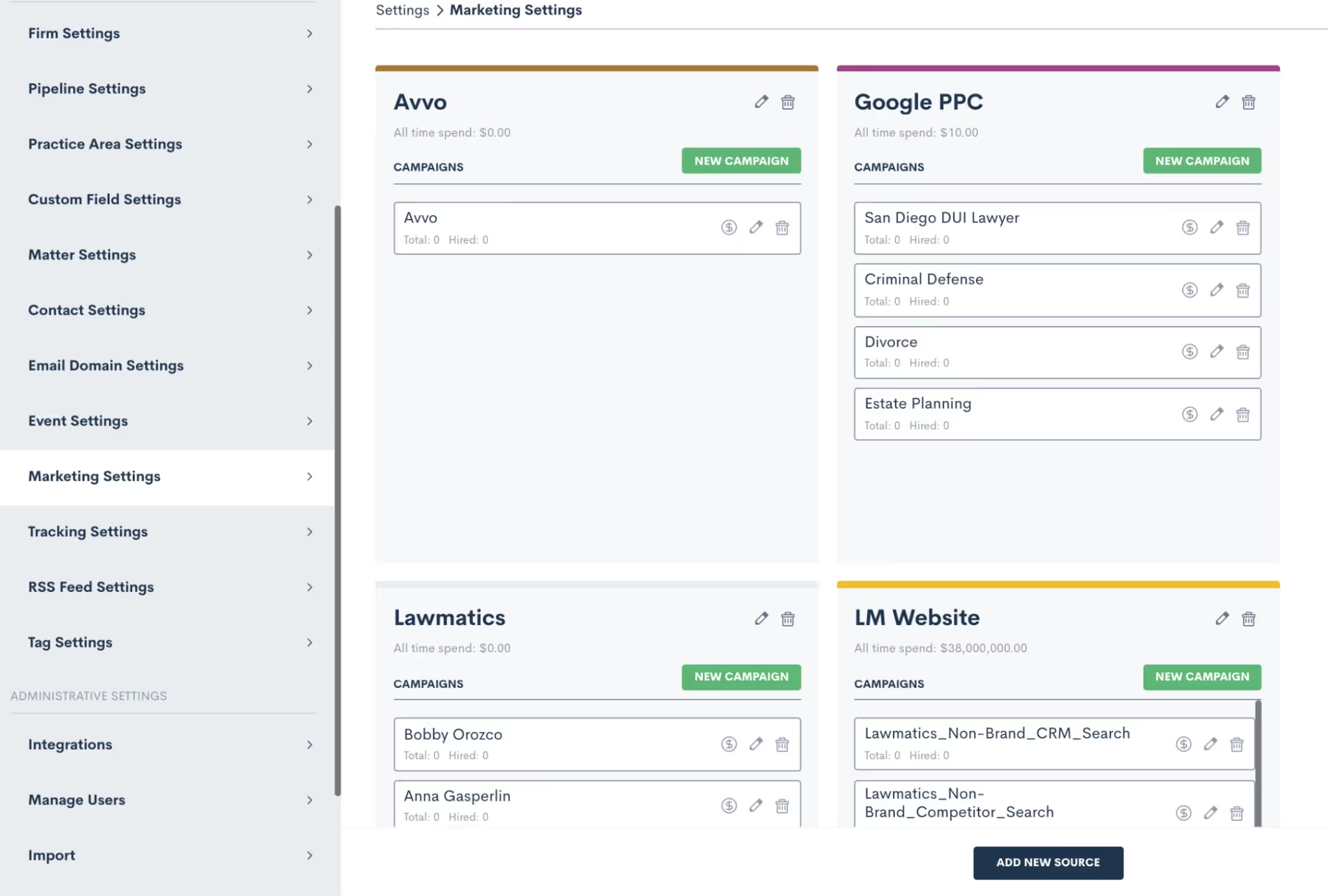
This spend will be used for calculations not only on the ROI Tracker, but also for the Stats by Source section of the Analytics page.
Matter Values
In order to get insightful ROI results you will also need to make sure you populate the revenue on each matter into the built-in Actual Value field. This step is crucial for making sure you get an accurate return on investment calculation.Remember, you’ll populate both the estimated value and actual value in the details page on any matter.

Put Your Data to Use
While all this data collection and reporting potential is great, the crucial next step to growing your firm is interpreting your KPIs and reports to make insightful decisions about the future of your firm. Instead of just being aware of a marketing source that has low to zero ROI, you now have the insight with Lawmatics to reduce your spend accordingly so you’re not investing in a poorly performing source. Maybe you have always had an idea of which of your practice areas was the most profitable, but now that you have the ability to actually track the exact performance, you may realize that it makes sense to invest more in a different practice area.All of these insights are right at your fingertips with the power of Lawmatics reporting and analytics.
Law school didn’t necessarily prepare you to run a business. If you operate a law firm, you might feel like you’re drowning in marketing jargon and business acronyms and initialisms. One increasingly common industry term is CRM or legal CRM. Here’s everything you need to know about what it means and what it does.
What is CRM?
CRM stands for Customer Relationship Management. A CRM platform is software designed for businesses to organize, track, and analyze data related to their customers: communications, notes, documents, and more. It covers the entire client lifecycle, from marketing and referral sources to soliciting reviews after a service is performed. By consolidating communications, records, and data into one central hub, businesses get both a birds-eye view of their operations and granular details necessary for day-to-day functions. Simply put, a CRM saves time, spares headaches, and impresses customers.If any specific functions of a CRM seem complicated or like a lot of work, just remember that automation is your friend. A quality CRM comes with tools like automations so that your firm can get more done while doing less work.
What are the main types of CRM?
Broadly speaking, there are 4 types of CRM systems on the market: analytical CRM, collaborative CRM, operational CRM, and strategic CRM.
1Analytical CRM
Analytical CRMs focus on using customer data to inform strategic decisions. This may have an emphasis on marketing, such as what ad campaigns drive the most engagement and convert the most prospects into customers. An analytical CRM provides insight into your customers’ behavioral trends, and in doing so identifies current strengths and opportunities. Analytics create a high-level overview necessary for businesses to be responsive to the needs of their customers. Think of an analytical CRM as a way of listening to your customers, only you’re listening to their actions instead of their words. For example, a personal injury firm could use an analytical CRM to optimize its client intake process with a deeper understanding of what causes a prospect to hire their firm.
The benefits of an analytical CRM system are in increased business efficiency. Are your current ad campaigns providing enough return on investment? Is there less demand for one of your services than you previously thought? By diving into the insights of an analytical CRM, you can target leads and prospects with segmented campaigns, increase your ROI, optimize your investments, and create customer journeys that will leave your customers satisfied.
2Collaborative CRM
A collaborative CRM is a tool for internal communications and collaboration. This is most useful if a customer will have contact with several touch points within your business. By keeping up-to-date customer data in one system, businesses can impress more of their customers with a consistent and personalized approach. The data tracked in a collaborative CRM allows your support team to see that they’re not on a call with Client #24601, but with Sandy from Palm Beach who called the billing department last week regarding a recent development in her case. Although a customer may not have a direct interaction with a collaborative CRM system, their customer experience will be shaped by the CRM’s ability to create seamless interactions across all departments. For example, a larger law firm might have a client with multiple matters spanning different practice areas. A collaborative CRM captures and presents a unified story of that client’s relationship with the entire firm. The benefits of a collaborative CRM lie in seamless experiences for both your customers and your staff. Improve real-time communication between silos, and identify opportunities to create a more robust and consistent customer experience.
3Operational CRM
An operational CRM is most concerned with facilitating business operations that grow customer relationships. Whereas an analytical CRM is about ‘seeing’ and a collaborative CRM is about ‘sharing,’ an operational CRM is about ‘doing.’ These typically feature tools like email campaigns, workflow pipelines, and automations for marketing and sales. Operational CRMs often power customer interactions like self-service appointment booking or automatic follow-up emails. A law firm that handles high volumes of consultations might prefer the task-oriented features of an operational CRM.The benefits of an operational CRM come in more personalized experiences for your customers. Automations can personalize emails and other communications with names and relevant information, without your staff needing to do extra work. In fact, your staff will save time because an operational CRM will execute manual, repetitive administrative tasks such as client intake, conflict checking, consultation scheduling, and more. Your staff can instead focus their energies on other aspects of growing the business and delivering quality service to your customers.
4Strategic CRM
A strategic CRM specializes in long term customer relationships. While an analytical CRM focuses on general trend insights, a strategic CRM provides feedback on ongoing relationships. Some common features of a strategic CRM may also be found in collaborative CRMs, like data on previous interactions with a particular customer. If your law firm succeeds because of repeat clients, a strategic CRM tells you why a client keeps coming back.The benefits of a strategic CRM, like with analytical CRMs, are in its ability to form the foundation of data-driven marketing and operations strategies. As an overview of the customer’s journey through a long term relationship, a strategic CRM offers insights on areas like marketing, sales, and customer service.
What CRM is right for me?
The answer depends on the needs of your law firm. Are you looking for a tool that helps customer acquisition? Do you need help creating a marketing strategy? Want to make sharing information easier within your organization? Do you need industry-specific features, like conflict-checking for legal matters?One thing to note: some CRM systems combine features from multiple types of CRM. The only way to know for sure if a CRM is right for you is to try it. If you’re a law firm in search of an analytical, collaborative, or operational CRM, get a demo of Lawmatics today. Our all-in-one CRM for law firms can elevate your firm’s efficiency, organization, and customer service. Lawmatics is the CRM you need it to be.
Subscribe to get our best content in your inbox
Ready to grow your law firm with Lawmatics?
Schedule a demo of legal’s most trusted growth platform.
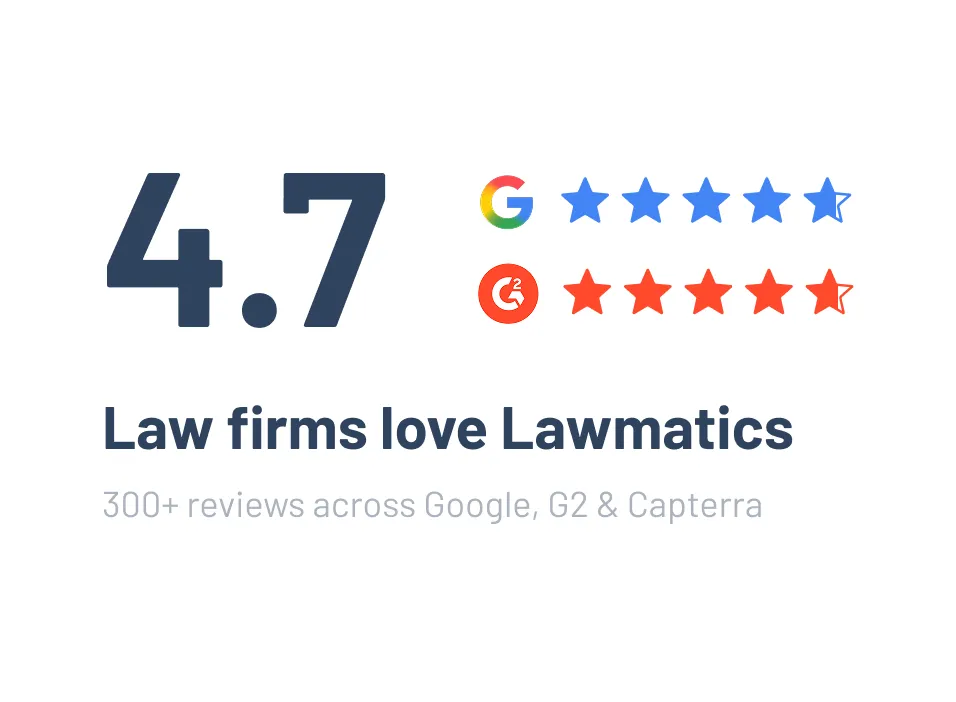




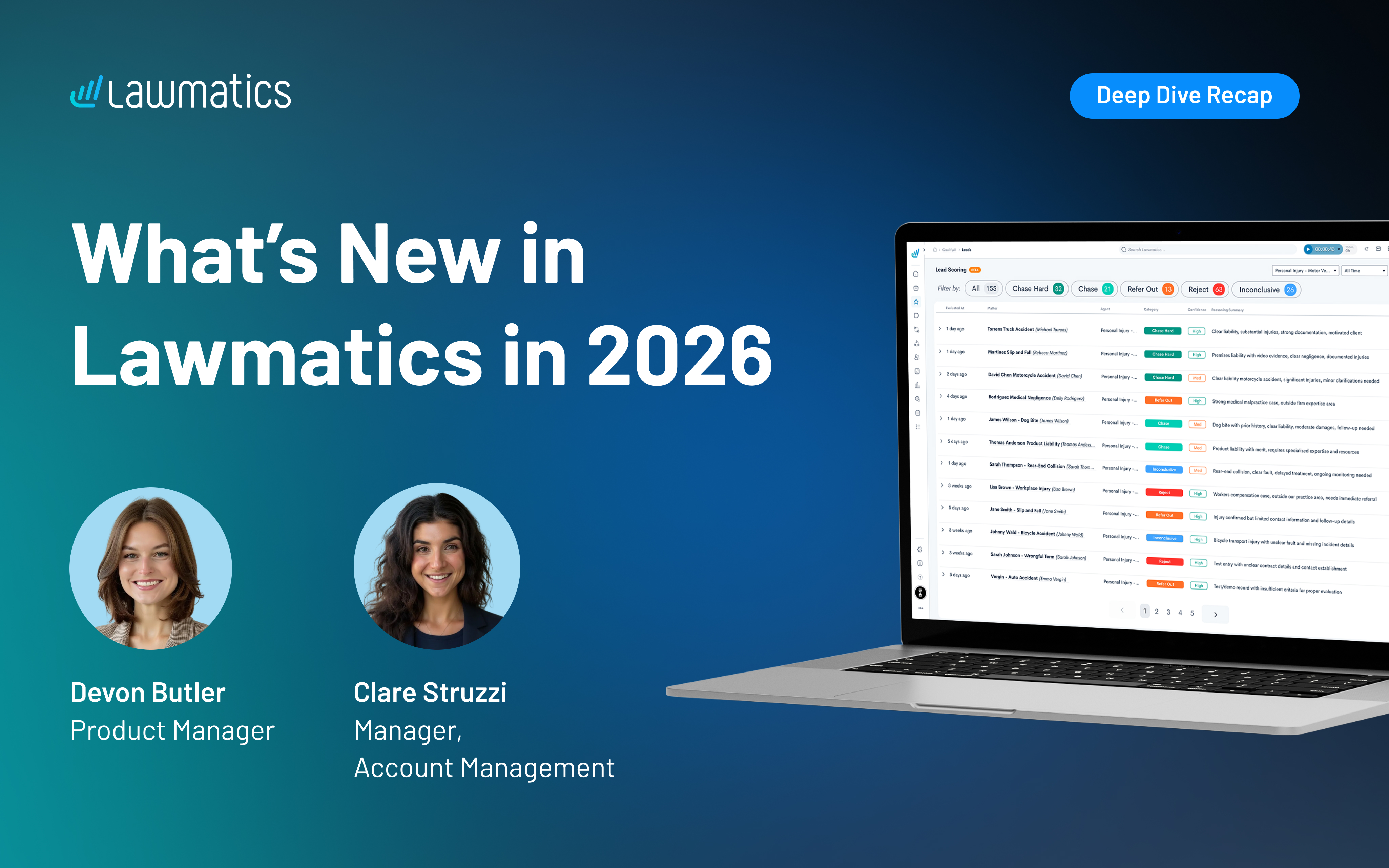


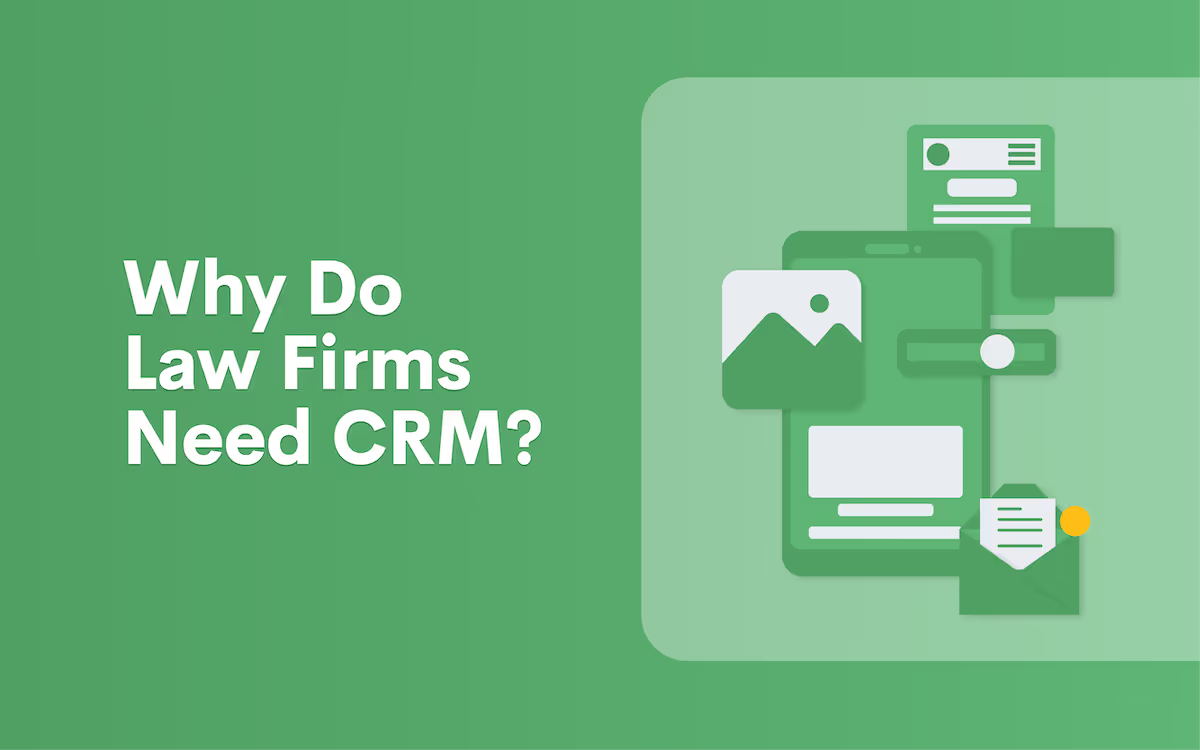

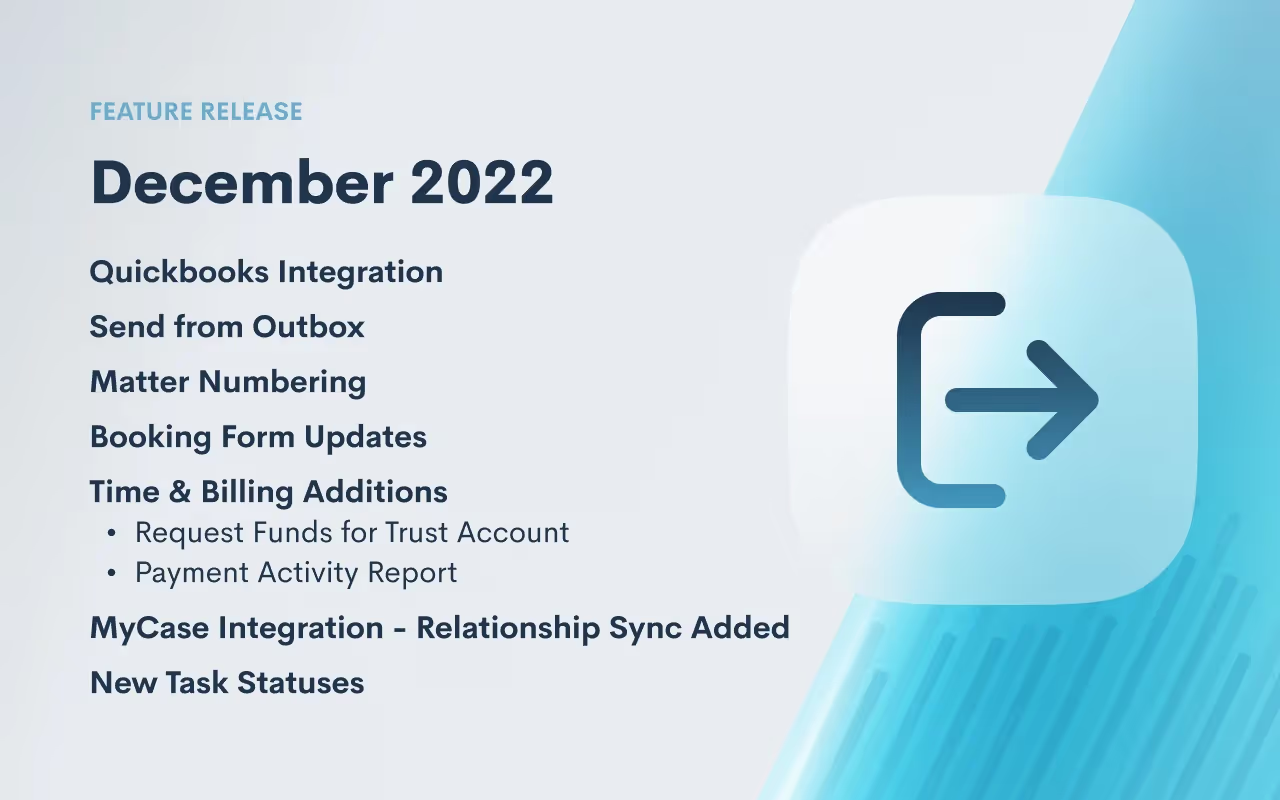
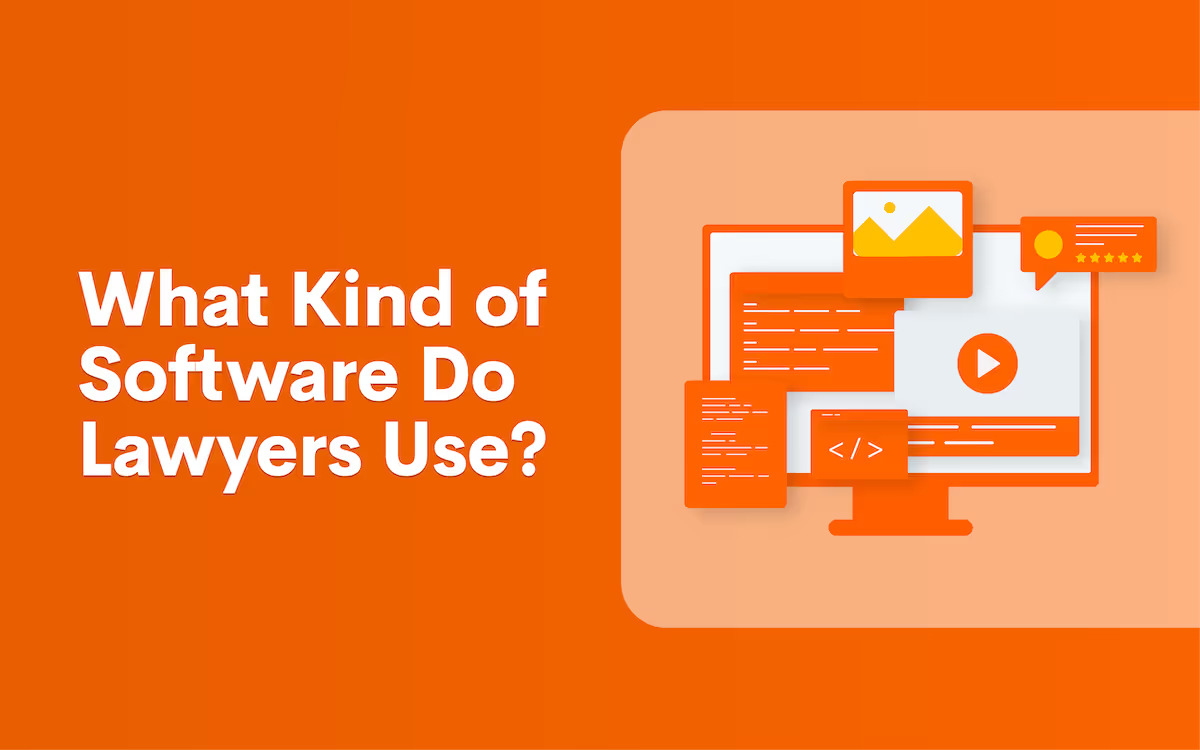
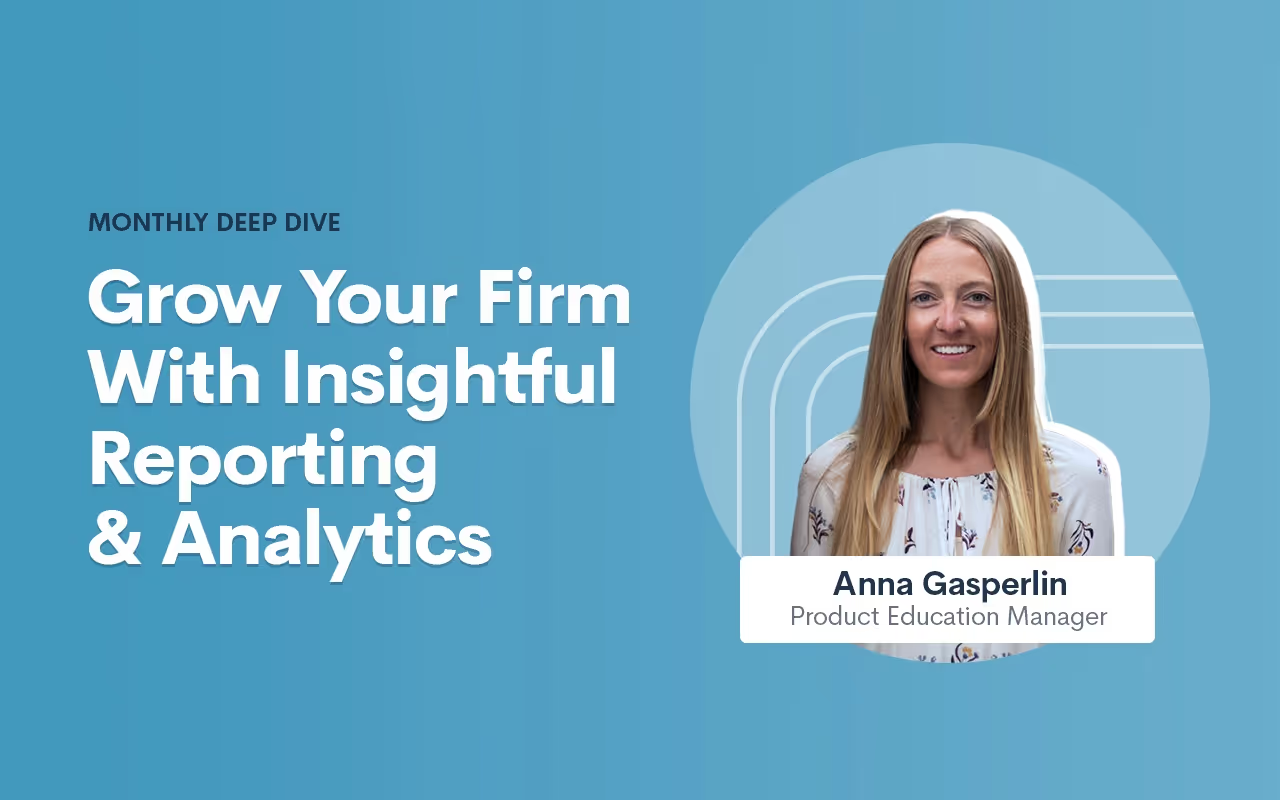

.avif)
.avif)

.avif)
